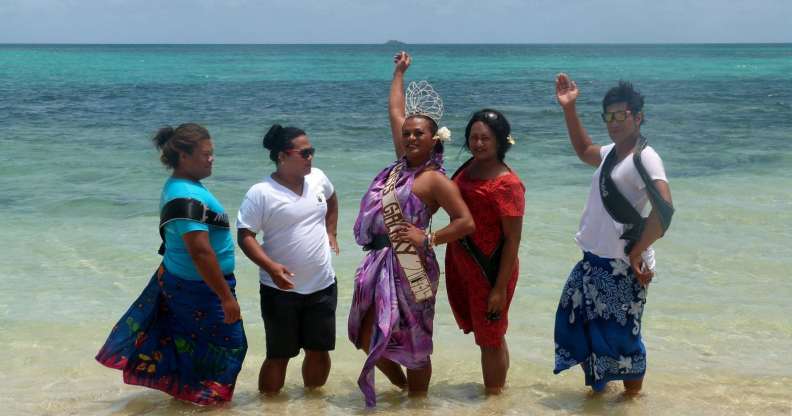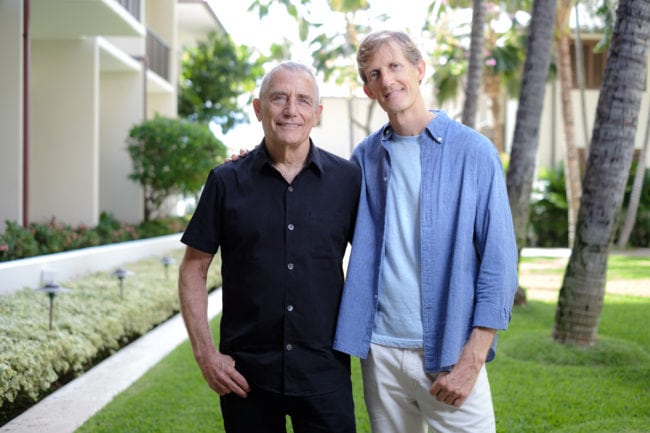Meet the transgender community resisting anti-trans Colonial-era laws on the remote Tongan islands

Leitis on Fafa Island
Tonga is a sprawling mass of 169 incredibly remote islands in the South Pacific. Get to one of the handful that are inhabited by taking one of a few flight paths from New Zealand, Australia or Fiji to Tonga’s one airport in Nuku’alofa.
Here, in the deepest South Pacific, extreme Conservative values enforce Colonial-era laws which weigh heavily on the shoulders of the Leitis, a group of transgender women who have been remarkably resisting the norm in Tonga for generations.
As with any remote community, progress for the Leitis has been slow, rather, standstill, since the oppressive Colonial rule of the British.
Without the modern medical facilities of the populated mainland, they persevere without hormone therapy or gender reassignment surgery and in the face of adversity from traditionalist close-minded islanders.
The plight of the Leitis caught the eye of award-winning US filmmakers Dean Hamer and Joe Wilson, whose film Leitis In Waiting, they say, is the first time anyone has told the story of the famous Leitis from the perspective of the group themselves.
Resisting the locals who make the Leitis feel like outcasts on their own soil, their main opposers are anti-gay and anti-trans religious groups who enforce Tonga’s anti-trans laws which criminalise the Leitis in their own home.
“One of the striking lines in the film is when a fundamentalist minister tells the Leitis: ‘You have no rights,'” Dean and Joe remember in a talk with PinkNews.
“When we started asking questions about Colonial-era laws that are still on-the-books in Tonga that criminalize LGBT+ people, he responded by saying that there would be violence against Leitis if they or anyone pushed for reform.
“That a so-called man of God would say such things so brazenly on-camera was a stark reminder of the day to day, minute to minute realities and threats that transgender and LGB people face in Tonga and so many other parts of the world.
“They are always walking a very fine line, needing to be conscious of those around them and what might set them off or spark something violent in other people, even in the churches and own families.”
Existing separately to the religious Tongan mould, the Leitis are treated “with a very deep suspicion.” Local Tongan people don’t believe human rights “should be recognized outside of a religious context.”
The Leitis lead a moderate and earthly existence on the island – exiled by most, they are remarkably loved by the Tongan royal family, and exist in close proximity to them, a relationship which is explored deeply in the film.
The contradiction goes further, as the Leitis – as well as exiled by Tongan law – are also in cahoots with important Tongan leaders and helped Dean and Joe enable some of the film’s most startling interviews.
One of the Leitis the filmmakers worked closely with was called Joey. “We were concerned it would be difficult to connect to the Kingdom’s leaders,” Dean and Joe tell us.
“But with Joey as the lead, it made filming easier. We were able to talk to the Catholic Cardinal and the heads of other mainline churches… and even the princess who is a patron supporter and key ally of the Tonga Leitis Association!”
Condemned by swathes of religious locals, it is also something of a contradiction that the Leitis remain loyal to Tonga and reject ‘mainstream’ or ‘Western’ approaches to LGBT rights.

Dean Hamer and Joe WIlson (Getty)
“One of the important points of the film is that the Leitis in Tonga are setting themselves apart in that singular identity,” reveal the couple, who are life partners away from their work.
The Leitis argue their Tongan standpoint on transgenderism, as Dean and Joe explain, is (despite the tensions) “a little further along” than it is in the West.
“In the West there is still a real lack of basic understanding of transgender people – the feeling of ‘how can you feel anything other than your sex at birth?’” the couple explain.
“In Tonga, most people seem to understand that some people are just naturally Leitis – but there’s still the feeling that they don’t deserve to be seen or accepted as a full part of society.”
Leitis In Waiting is the first film to give the Leitis a platform, rather than document their plight from the perspective of outsiders.
Joe and Dean’s work is about magnifying difference, rather than speculating about it – and in that sense, the film is a project of activism.
“No matter where we are across the globe, including on social media, we simply need to do our part to de-stigmatise transgender folks,” the filmakers add.
As the Tongan Leitis Association says: “Leave No One Behind.”

